Last page update:
The APEC Science Prize for Innovation, Research and Education (“ASPIRE”) is an annual award which recognizes young scientists who have demonstrated a commitment to both excellence in scientific research, as evidenced by scholarly publication and cooperation with scientists from other APEC member economies.
The ASPIRE Prize supports APEC’s mission to:
- strengthen international science and technology networks;
- enhance economic growth, trade and investment opportunities in harmony with sustainable development, through policies, innovative R&D and technologies, and knowledge sharing; and
- improve linkages and efficiency between research and innovation.
ASPIRE 2016: Technologies for Food Security
Each year the APEC host economy is asked to provide a theme to guide nominations for the ASPIRE Prize to be awarded in their host year. For its host year of 2016 Peru selects "Technologies for Food Security” as the ASPIRE nominating theme. This theme focuses on innovative technologies that enhance food security, food safety, and nutrition to build resilient and healthy communities across the region.
Each member economy, through its representative on the APEC Policy Partnership for Science, Technology and Innovation (PPSTI), is invited to nominate one young scientist under the age of 40 to be considered for the 2016 ASPIRE Prize. Nominees should demonstrate excellence in scientific research, as evidenced by scholarly publication, and cooperation with scientists from other APEC member economies in fields such as: agricultural and environmental studies, sustainable development, agri-business management, nutrition, and other relevant disciplines.
ELIGIBILITY
Any citizen of an APEC member economy is eligible to be nominated for the ASPIRE Prize. He/she must be living at the time of his/her nomination and be under the age of 40 as of 31 December of that year (i.e., all 2016 nominees must be under the age of 40 as of 31 December 2016).
SELECTION PROCESS
Each member economy, through its representative on the APEC Policy Partnership for Science, Technology and Innovation (PPSTI), is invited to nominate one young scientist under the age of 40 to be considered for the ASPIRE Prize.
Individually qualified applicants are encouraged to complete the “Local Nomination Form” and send it to PPSTI Program Director Mr. Alex Rogers ([email protected]) by 8 April 2016 so it may be directed toward local economy reviewers.
Once nominations are received, PPSTI members rank the nominees through a selection ballot to determine the winner. PPSTI members are asked to judge the nominees based on how well they have demonstrated:
- excellence in scientific research, as evidenced through scholarly publication;
- commitment to cooperation with scientists from other APEC member economies; and
- contribution to the theme of “Technologies for Food Security” as demonstrated by the impact to APEC economies through commercialized research and market-led innovation.
The winner will be recognized at an award ceremony during the Eighth APEC PPSTI Meeting in Lima, Peru scheduled for August 2016.
ASPIRE PRIZE SPONSORS
Wiley and Elsevier, two of the world’s leading publishers of scholarly scientific knowledge, have committed to funding prize money in the amount of $25,000 USD.
ASPIRE PRIZE WINNERS
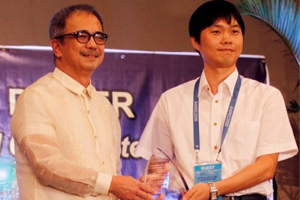 |
2015: Dr. Jong-Seong Kug (Republic of Korea)
Dr. Jong-Seong Kug was awarded the 2015 ASPIRE Prize in Manila by Secretary Mario Montejo of the Philippine Department of Science and Technology. Dr. Kug is an Associate Professor at Pohang University of Science and Technology’s School of Environmental Science and Engineering in Korea, and his El Niño prediction model has helped the Korea Meteorological Administration better understand tropical climate dynamics, and forecast and track extreme weather—an area that addressed Philippines’ theme of “Disaster Risk Reduction: Understanding the Role of Climate Change and Variability.” Read news release here. |
|
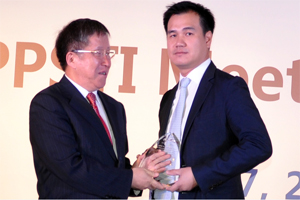 |
2014: Dr Agachai Sumalee (Hong Kong, China)
Dr. Agachai Sumalee, a Thai professor at the Hong Kong Polytechnic University, was awarded the 2014 ASPIRE Prize by Cai Jianlin, China’s Vice Minister of Science and Technology. China selected the theme of “Intelligent Transportaion”to reflect China’s interest in facilitating green and sustainable growth, environmental protection and low-carbon economies. Dr. Sumalee designed a model in collaboration with researchers from across the APEC region that allows highway managers to predict traffic conditions and prevent congestion. This led to ground breaking road traffic management system that slashed commuting times in the greater Bangkok area. Read news release here. Read featured article here. |
|
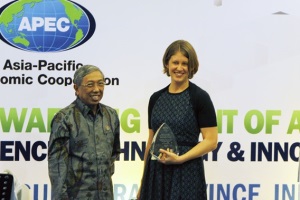 |
2013: Dr. Carissa Klein (Australia)
Dr. Carissa Klein of Australia was awarded the APEC Science Prize for Innovation, Research and Education (ASPIRE) by Gusti M. Hatta, Indonesia’s Minister of Research and Technology. Dr. Klein’s selection is a result of her research with the University of Queensland that uniquely addresses the issue of sustainable ocean development by striking a balance between biodiversity conservation and socioeconomic viability. Read news release here. |
|
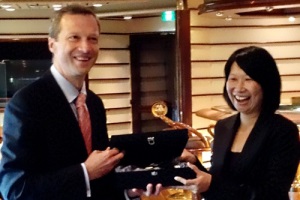 |
2012: Dr. Rossa Wai Kwun Chiu (Hong Kong, China)
Russia selected health innovation as its 2012 ASPIRE nominating theme, building on its desire that APEC actively foster cooperation among economies in major innovation areas, such as human health, to support healthy lifestyles, productivity and economic growth. Dr. Chiu’s groundbreaking research and innovations in chemical pathology has brought non-invasive prenatal diagnosis of fetal genetic diseases into routine clinical use around the world. Read news release here. |
|
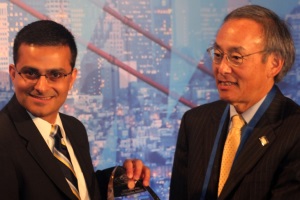 |
2011: Dr. Ali Javey (United States)
The United States selected green growth as its ASPIRE nominating theme, building on its desire that APEC actively promote environmentally sustainable economic growth and development, and help economies successfully transition to a clean energy future. Dr. Javey’s innovative work with nanomaterials has made great strides in developing a new generation of solar energy technology and reducing energy consumption in "green electronics." Read news release here. |
|

